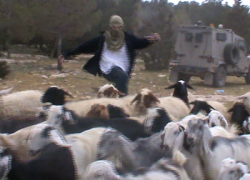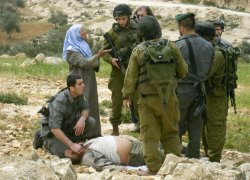CPTnet
23 March 2011
SOUTH HEBRON HILLS: Palestinian man stabbed by settler near
At-Tuwani two days after settler riot disrupts replanting of damaged olive
trees
[Note: The Los Angeles Times included a photo of the stabbing victim in a story about settler attacks increasing in the West Bank: https://latimesblogs.latimes.com/babylonbeyond/2011/03/west-bank-palestinians-rise-in-settlers-attacks.html
On the morning of 21 March shortly after 7:00 a.m., an
Israeli settler attacked and stabbed a Palestinian father of two from Tuba
village near the outpost of Havat Ma’on in the South Hebron Hills. Mahmoud Ibrahim Ali Awad, 32, was
traveling by donkey from his home in Tuba to a medical appointment in the city
of Yatta when a masked settler ran out of the Havat Ma’on outpost and attacked
him with a knife. A resident of At-Tuwani
witnessed the assault, quickly called villagers and internationals, then
interrupted the attack. The assailant
ran back into the Havat Ma’on outpost. Villagers recognized him as a settler who was involved in a
riot in the village earlier that week (see below.) An ambulance transported Awad to Alia Hospital in Hebron, where
he remains with stab wounds to his chest and right arm.
Two days earlier, on 19 March, settlers from Havat Ma’on
rioted near Tuwani in response to the planting of twenty-five olive trees in
Palestinian olive groves there.
Israeli peace activists and internationals had joined with villagers to
replace mature olive trees that were hacked and destroyed in the grove earlier
this month. Shortly
after 9:00, a.m., approximately twenty-five settlers emerged from the Havat
Ma’on and moved among  Palestinians who were grazing sheep and collecting herbs
Palestinians who were grazing sheep and collecting herbs
near the olive groves in Humra valley, the nearby Khoruba valley and on Khoruba
hill. The settlers, several of
whom were masked, shoved and kicked the villagers and their sheep and also
internationals and Israeli peace activists who had come to assist in replanting
the damaged olive trees.
Israeli soldiers and border police declared the area a
closed military zone and discharged two percussion grenades in an attempt to
force villagers to leave the area. Border police arrested two Palestinian men, who remain in
custody, and one elderly man, Fadil Ahmed Raba’i, collapsed from respiratory
distress and lost consciousness after soldiers pushed him to the ground and forcibly
restrained him. Soldiers refused
to allow the  ambulance direct access to the old man and instead required the
ambulance direct access to the old man and instead required the
driver to take a detour, resulting in a forty-five minute wait. Raba’i was released from the hospital
in Yatta later that day. Israeli soldiers
and border police did not arrest or detain settlers.
More pictures of the incident are available at: https://cpt.org/index.php?q=gallery&g2_itemId=22477 and at https://snipurl.com/27nyqe
Villagers think these events may have been triggered in part
by the recent killing of a settler couple and their children in Itamar settlement
near Nablus. Police have neither charged nor arrested any Palestinians, and
recent evidence indicates that one or more Thai workers, angry because they had
not received payment for their labor, may have committed the murders.
Palestinians and internationals working in the West Bank
have expressed concern over a recent rise in settler violence. According to the Israeli legal rights
group Yesh-Din, Israeli settlers are rarely charged with crimes committed
against Palestinians, and if they are, their cases appear in civilian court, where
they receive legal safeguards and protections. When Palestinians are charged, their cases appear in Israeli
military courts, and they do not enjoy the same legal protections. Additionally it is extremely difficult
for Palestinians to gain redress for crimes committed against them by settlers.
According to a recent report by
Yesh-Din, out of 642 monitored investigations of Palestinian complaints against
settlers, police closed 91 percent without an indictment.
[Note: According to the Geneva Conventions, the
International Court of Justice in the Hague, and numerous United Nations
resolutions, all Israeli settlements in the Occupied Palestinian Territories
are illegal. Most settlement outposts are considered illegal under Israeli
law.]



